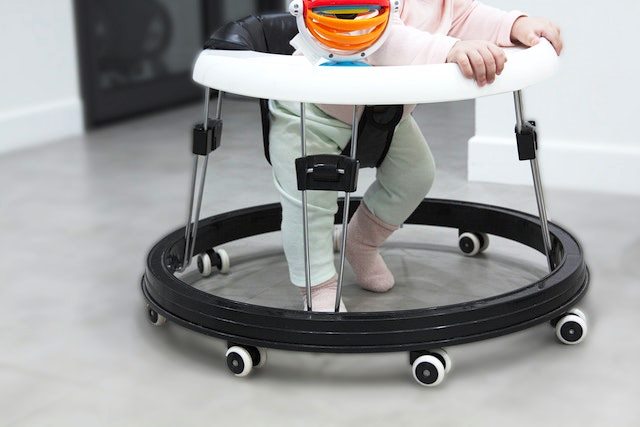Parents feel proud when they see various signs of growth in their babies. All the moments are precious, from a baby’s first smile to their crawling, and by the end of the year, most babies start learning to walk. Well, some babies also try to walk in 6 -8 months. They try to explore various things in your house by crawling or standing, then getting up and moving towards the fascinating objects.
Parents introduce walkers to their babies at this stage, thinking it will teach them to walk fast. Additionally, it will prevent their babies from falling again and again. Walkers are mobility devices that can be used by babies to move from one place to another. They are mainly made for babies from 6 to 16 years old.
The article discusses more about baby walkers. So, keep reading it to know more about the merits and demerits of using a baby walker and the right time to introduce a baby walker.
MORE POSTS: 10 Best Toys to Help a Baby Walk
When Can I Put My Baby In A Walker?

Baby walkers are devices that help in walking your baby from one place to another. A Walker comprises a hard plastic that sits above the wheels and a seat with two leg holes. You have to put your baby inside these two leg holes, and he will try to walk independently or move towards any object. The wheels will help your baby in moving in any desired direction. The seat of the walker consists of good fabric.
There is no fixed age to put your baby in a walker. But you need to consider the below factors before introducing a walker to your baby.
1. Your Baby Should Hold His Head Adequately
Your baby should hold his head or move his head independently or without your support. Most babies start holding their heads by six months and try to sit. Holding the head indicates adequate strength in their neck, and they are ready to introduce a walker.
2. Right Age
The appropriate age for introducing a walker is usually when your baby is 6 to 8 months old.
3. Your Baby Should Have Some Mobility
Your baby must have at least some level of mobility. For example, he must be a good crawler and try to stand on his feet by holding the bed or his crib.
4. Positioning
When you put your bay inside the two leg holes of a walker, his feet should touch the floor. If you find your baby’s feet are not touching, then it’s not the right time to introduce a walker. Every baby is different, and its growth stages also differ. Some babies may start walking at
seven months old, while some start walking by the end of one year. So, you don’t need to panic about it.
5. Interest
Your baby should have some interest in knowing things around him. For instance, if he crawls and moves toward any object or person, it’s time to introduce a walker.
However, you need to consider all five factors while introducing a walker to your baby.
What Are The Pros Of Using Walker?
You become excited and overwhelmed with joy when a baby comes into your life. But the joys can be reduced when you want to do urgent work, and your baby does not allow you to do it. For instance, you need to do household chores, and your baby is crying.
So, you need to leave all the work and hold your baby in your arms or show him some of his favorite toys so that he will stop crying. In such a case walker can be a great relief for you.
We are listing below some of the pros of using a baby walker.
1. Keep Your Baby Engaged
The Majority of baby walkers available in the market come with toys. You can put your baby in a walker, and your toddler gets happy to see the toys or move from one room to another. In short, it keeps your toddler busy, and you can complete your household chores or office work by that time.
2. Enhance Mental Development
Most baby walker comes with toys. They are of different colors and shapes; toddlers will try to watch them continuously and figure them out. This process will significantly enhance the mental development of your baby.
3. Encouraging
Walkers will encourage your child to walk from one location to another.
4. Independent
Seeing your child taking his first steps on the floor is nice and special. You try to capture this moment on your camera so that you can look at it afterward. But when your child learns to walk, he will fall again and again and get hurt.
Unfortunately, every time you cannot be with your toddler. So, the walker will enable your toddler to move independently and without falling.
MORE POSTS: Newborn Winter Essentials to Keep them Warm & Safe
What Are The Cons Of Using Walker?
Baby waker has some cons, which are listed below.
1. Your Baby May Fall From Stairs
Baby walkers allow your baby to move fast in any direction. It can be a problem when you have stairs at home. Your baby can fall from the stairs because of a walker.
According to CPSC, a lot of toddlers are injured because of walkers. It is estimated that 25,700 infants below 15 months were injured and admitted to the hospital in 1992 because of using walkers.
2. your Baby May Lose Balance
Baby moves at very high speed on a walker, and that can cause them to lose balance and fall. It can badly injure him.
3. Injures His Head
When your baby falls on a walker, his head gets injured most of the time. Babies have very delicate skulls, and being injured in this stage can have serious consequences.
4. Increases Death Risk
Your baby can reach things with a walker, which he usually cannot get by crawling. For example, he can pull on various things on the shelf of your home.
There can be some heavy objects on the shelf that can fall on your baby and can badly injure it. He can also access bleaching or cleaning products and may consume them by mistake. It can lead to the death of your baby.
Your baby can also accidentally fall on the swimming pool because of a walker, increasing your baby’s death risk.
5. Make Delay In Walking
A study conducted on 109 infants showed that the babies who used walkers have late physical development or walk lately compared to those who did not use walkers. Your baby uses his toes while using a walker, which tightens his leg muscles and interferes significantly with walking normally.
You need to keep all these things in mind while buying a walker for your baby.
Precautions While Using Baby Walker
- You should allow your baby to use a walker only with supervision. There must be someone with your baby while using a walker so that you can reduce the risk of accidents.
- You must remove any sharp objects when your baby is using a walker.
- Allow your baby to use a walker only on a flat surface.
- Your baby should be away from the staircase while using a walker.
- The walker should not topple.
- The walker must be sturdy.
Conclusion
Baby walkers are great for developing cognitive skills in babies. But don’t allow your child to sit for long hours on a walker; otherwise, it will hamper your baby’s leg muscles. It will even delay its sitting, walking, and others. It’s best to allow your baby to use a walker only for 10 -15 minutes daily, under supervision.
There are also some healthy alternatives to walkers like you can buy parent-assisted walkers for your baby. These walkers are entirely different from traditional ones and require someone’s parent’s help moving from one place to another. It will even help in increasing the physical development of your babies.
MORE POSTS: How to Dress During Pregnancy Without Maternity Clothes?



